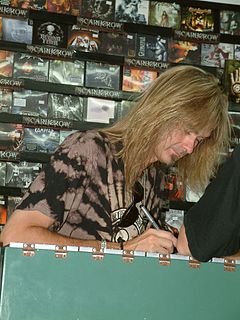A Quote by Lawrence M. Krauss
I don't know if science and reason will ultimately help guide humanity to a better and more peaceful future, but I am certain that this belief is part of what keeps the 'Star Trek' fandom going.
Related Quotes
To be a science fiction writer you must be interested in the future and you must feel that the future will be different and hopefully better than the present. Although I know that most - that many science fiction writings have been anti-utopias. And the reason for that is that it's much easier and more exciting to write about a really nasty future than a - placid, peaceful one.
'Star Trek' fans totally accepted my sexual orientation. There are a great number of LGBT people across 'Star Trek' fandom. The show always appealed to people that were different - the geeks and the nerds, and the people who felt they were not quite a part of society, sometimes because they may have been gay or lesbian.
Most of what I do is science fiction. Some of the things I do are fantasy. I don't like the labels, they're marketing tools, and I certainly don't worry about them when I'm writing. They are also inhibiting factors; you wind up not getting read by certain people, or not getting sold to certain people because they think they know what you write. You say science fiction and everybody thinks Star Wars or Star Trek.
That's what 'Star Trek' was: We don't know how to make an ideal society, but we're going to portray that, and then we're going to work backward. I think that's why science fiction - despite the dystopian parts - comes out of this super ideal that, eventually, we will get to some better place where we actually live up to our ideals.
How could I have kept out this incredible fiction? That's when it all started for me. I was, and still am, a HUGE Star Trek fan. "Songs Of The Ocean" is my tribute to this great story, and it's based on the Star Trek IV movie, the one in which they go back in time. [The Voyage Home ; It's the one where they bring a pair of whales to the future -ed.]
































